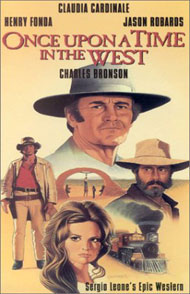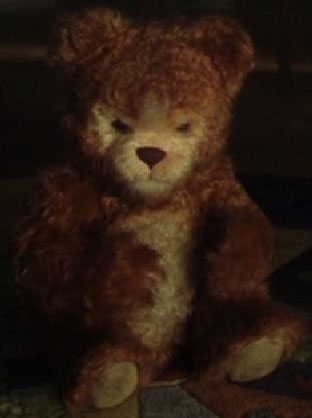
Once
Upon a Time in the West
(1969)

Rated: PG
Runtime: 2 Hours and 45 Minutes
Reviewer: Jones
Grade: A+A trio of outlaws arrive at a train station. These men need not say a word. You know that their purpose in being here has no good will behind it. The ticket salesman is put under lock and key and a young lady is sent fleeing. The men take up positions outside the station and wait for a train. One of the men is pestered by a fly, another by water dripping on his hat and the last of them just plain looks pestered. After a time, the train arrives, a harmonica wails and three men are dead and another wounded in a brilliant flash of fury.
Welcome to the world of Sergio Leone.
Sergio is a man who shouldn’t need an introduction, but probably does given the sorry state of a world that is bludgeoned to death by Jerry Bruckheimer films on a near weekly basis.
Sergio was a God among directors. He made some of the greatest films the screen has ever seen including “The Good, The Bad and The Ugly”, “Once Upon a Time In America” and this film to name a few. He had a way with the camera that has been often imitated, but seldom reproduced. His films relied on restraint while being bold and brash at the same time. The heroes (If you want to call them that.) of his films were men of few words who allowed their actions to speak for themselves. Scenes such as the one involving the train station, lasted ten minutes with a minimal amount of dialog being spoken, but Sergio keeps you riveted to the screen with his keen eye for human nature, as well as the anticipation of what is to come. He has been behind some of the most gorgeous and dramatic shots in film history. He was a man with no equal. He was, and is, a God.
As I mentioned before “Once Upon a Time In The West” is one of the films that elevated him to this “God” status. It is a film that is epic in design, but has a very noble down-to-earth quality about it as well. There are two central questions to this film. The first being: “Why is “Harmonica” (Charles Bronson) intent on tracking down Frank (Henry Fonda)? The other is:
“What is so special about the land that Jill (the infinitely gorgeous Claudia Cardinale) resides on? These questions are pondered and investigated through the interlocking stories of Frank, “Harmonica”, Jill and Cheyenne (the incomparable Jason Robards).
The story begins at the previously described train station and continues with Frank showing just how evil he really is. I won’t ruin it for you, because it is an amazing feeling when you realize that it is Henry Fonda who is committing these cruel acts. Jill arrives at a different train station only to find no one there to greet here and a life that is now in shambles. Along the way to her new home she stops at a saloon only to run into Cheyenne. He has just escaped from the police and drops into the saloon to wait for his men to arrive. While at the saloon he makes the acquaintance of “Harmonica” in one of a slew of memorable scenes from the film.
It turns out Cheyenne was set up to take a fall and he’s not too happy about it. He, along with “Harmonica” as self -appointed protector of Jill, have vowed, in their typically unspoken manner, to get to the bottom of what’s going on.
And that, my friends, is just the tip of the iceberg. It is a beautifully told tale with many unforgettable scenes to make you repeat the film over and over in your head after you first see it. The performances are all brilliant in every way imaginable. I mean what can be said about Jason Robards that hasn’t been said already? He is brilliant in the role of the sympathetic outlaw Cheyenne. Everything the man does is exquisite. The way he delivers his lines. The way he carries himself. Everything I say. December 26, 2000 truly was a dark day for cinema, as it marked the day that this legend of a man left us for greener pastures. May you forever rest in peace Jason Robards. You will be forever in my thoughts and memories.
It’s difficult to go on after realizing such a loss, but Robards, being the consummate man that he was, would have wanted to show to go on. One of the other standout performances is delivered by Charles Bronson as the soft-spoken man-with-an-agenda that is “Harmonica”.
He, as is typical for Leone’s primary characters, is a man of few words. When he does speak people would do well to listen, because the man does not waste his words. The incredibly gorgeous Claudia Cardinale brings a great amount of passion and determination to the role of Jill. I don’t think I have ever laid my eyes upon a more beautiful woman than Ms. Cardinale. She is a woman of many talents as she can act just as wonderfully as she looks.
She is one of the more intriguing female characters in the history of cinema. A woman who is very strong-willed that also knows when it’s time to accept a man’s help. She washes the men, who take pleasure in her body, away with a hot bath that makes her feel pure again.
She gains the respect of men like Cheyenne and “Harmonica” by way of her actions and her strong will. You wouldn’t expect men like them to respect her, but they do anyway. That is just a small part of what makes Jill such an interesting character. Henry Fonda delivers one of his most unusual performances. He is the bad guy! He does a fine job with a role that is most definitely not one that he is accustomed to. Frank is a heartless, soulless prick and Henry plays him to perfection. Few villains have ever been so ruthless. Rounding out the cast are Gabrielle Ferzetti as a railroad baron of sorts, as well as some cameo appearances by the likes of Jack Elam, Keenan Wynn, Woody Strode and Lionel Stander. The cameos are all short, but memorable, and they all do nothing but add to the film as a whole.
I have already praised Sergio earlier in the review, so I will not belabor the point now. His work can speak for itself. Someone I will take the time to praise now is composer extraordinaire Ennio Morricone. Much the same as Sergio is the God of directors, Ennio is the God of composers. The man has done so many scores that he has lost count. Some of the most distinctive scores belong to this man. Whether you know it or not you have heard his score from “The Good, The Bad and The Ugly” and you should hear his work in “The Untouchables”. These are just two of a whole library of incredible film scores that we will never hear the likes of again. Unless, of course, Ennio chooses to bless us with something reminiscent of his past in his future work. What makes this score so special? There are too many reasons, but I shall attempt to touch on the majority of them.
He takes simplicity and makes us fall in love with it. Something like a harmonica for instance. He makes it haunt and enliven us at the same time. It sounds beautiful, yet disturbing at the same time. It is the theme of Bronson’s character and it suits him well. He is a simple man who is capable of goodness, as well as violence much the same as his them. I think that is what makes Morricone such a master. He gives each character their own individual theme that defines them perfectly without them ever having to be seen. Take Cheyenne’s theme for instance. It is sinister, playful, and mysterious all at once. I can think of no better way to describe Cheyenne than in this way, which is exactly what Ennio’s theme has captured. I get goosebumps just thinking about it. Out of all of Morricone’s work, it is his work on this film that I feel is him at his best. A work that is very diverse and rewarding, without which this film would not be half as good as it is.
Oh how I do love this movie. It even flirted with favorite film status for me for awhile before “The Good, The Bad and The Ugly” reasserted itself, in it’s proper place, as the heart and soul of what makes me love movies so much. I love them, because of movies like “Once Upon a Time In The West. They can be truly magical experiences when the right people are making them. People like Sergio Leone and Ennio Morricone make me love movies more than any man should.
And I love them for it.
